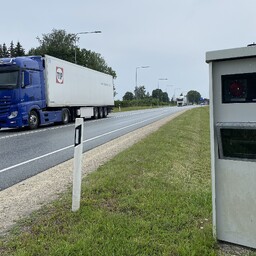Lauri Läänemets ja Sirle Loigo ütlesid Vikerraadio saates, et nad ei soovi luua jälgimisühiskonda. Nad rääkisid, et
automaatsüsteemid aitavad rikkujaid tabada
, kuid jälgimisühiskond ei ole hea lahendus. Carri Ginter hoiatas, et
riik võib tulevikus muutuda
ja hakata kasutama teistsugust poliitikat.
automaatsüsteemid aitavad rikkujaid tabada
Tõlge fraasile: automaatsüsteemid aitavad rikkujaid tabada
EN
automated systems help catch violators
riik võib tulevikus muutuda
Tõlge fraasile: riik võib tulevikus muutuda
EN
the state may change in the future
Läänemets rääkis, et
liiklusõnnetuste arv kasvas
, sest
politsei töötajaid on vähem
. Ta ütles, et kui politseinikke on vähem, siis inimesed harjuvad sellega ja hakkavad kiiremini sõitma. Lahenduseks ei ole rohkem politseinikke palkamine, vaid targemate lahenduste leidmine.
liiklusõnnetuste arv kasvas
Tõlge fraasile: liiklusõnnetuste arv kasvas
EN
the number of traffic accidents increased
politsei töötajaid on vähem
Tõlge fraasile: politsei töötajaid on vähem
EN
there are fewer police employees
Loigo rõhutas, et
politseinikud on riigi jaoks kallis ressurss
. Ta ütles, et
politsei peab leidma nutikamaid lahendusi
, et teha tööd efektiivsemalt. Automaatne järelevalve aitab, kuid politseinikud ei kao tänavatelt.
politseinikud on riigi jaoks kallis ressurss
Tõlge fraasile: politseinikud on riigi jaoks kallis ressurss
EN
police officers are an expensive resource for the state
politsei peab leidma nutikamaid lahendusi
Tõlge fraasile: politsei peab leidma nutikamaid lahendusi
EN
the police must find smarter solutions
Ginter ütles, et
liigne jälgimine ja karistamine võib tekitada trotsi
. Ta rääkis, et mõned teed on projekteeritud nii, et kiiruse ületamine on vajalik. Kui inimesed saavad trahvi, siis nad võivad muutuda vihaseks.
liigne jälgimine ja karistamine võib tekitada trotsi
Tõlge fraasile: liigne jälgimine ja karistamine võib tekitada trotsi
EN
excessive surveillance and punishment can create defiance
Läänemets ütles, et
keegi ei taha luua suurt andmebaasi
, kus kõik inimesed oleksid jälgimise all. Ta rääkis, et
automaatkaamerad on kasulikud
, kuid neid ei tohiks kuritarvitada.
keegi ei taha luua suurt andmebaasi
Tõlge fraasile: keegi ei taha luua suurt andmebaasi
EN
no one wants to create a large database
automaatkaamerad on kasulikud
Tõlge fraasile: automaatkaamerad on kasulikud
EN
automatic cameras are useful
Ginter hoiatas, et
suurte andmebaaside teke tuleb ära hoida
. Ta ütles, et politsei andmebaasides on palju andmeid, mida seal ei tohiks olla. Ta rõhutas, et
riik ei peaks jälgima seaduslikke kodanikke
.
suurte andmebaaside teke tuleb ära hoida
Tõlge fraasile: suurte andmebaaside teke tuleb ära hoida
EN
the creation of large databases must be prevented
riik ei peaks jälgima seaduslikke kodanikke
Tõlge fraasile: riik ei peaks jälgima seaduslikke kodanikke
EN
the state should not monitor law-abiding citizens
Läänemets ütles, et
tuleb leida tasakaal tehnoloogia kasutamisel
. Ta rõhutas, et oluline on, kuidas andmeid kasutatakse ja kui kaua neid säilitatakse.
tuleb leida tasakaal tehnoloogia kasutamisel
Tõlge fraasile: tuleb leida tasakaal tehnoloogia kasutamisel
EN
balance must be found in the use of technology
Lauri Läänemets and Sirle Loigo stated on Vikerraadio that they do not wish to create a surveillance society. They mentioned that automated systems help catch offenders, but a surveillance society is not a good solution. Carri Ginter warned that the state may change in the future and start using different policies.
Läänemets mentioned that the number of traffic accidents has increased because there are fewer police officers. He said that if there are fewer police officers, people get used to it and start driving faster. The solution is not to hire more police officers but to find smarter solutions.
Loigo emphasized that police officers are an expensive resource for the state. She said that the police must find smarter solutions to work more efficiently. Automated surveillance helps, but police officers will not disappear from the streets.
Ginter said that excessive surveillance and punishment can create defiance. He mentioned that some roads are designed in such a way that exceeding the speed limit is necessary. When people get fined, they may become angry.
Läänemets said that no one wants to create a large database where all people are under surveillance. He mentioned that automatic cameras are useful, but they should not be abused.
Ginter warned that the creation of large databases must be avoided. He said that police databases contain a lot of data that should not be there. He emphasized that the state should not monitor law-abiding citizens.
Läänemets said that a balance must be found in the use of technology. He emphasized that it is important how data is used and how long it is retained.

